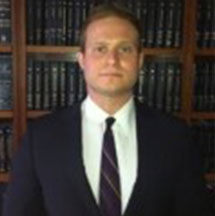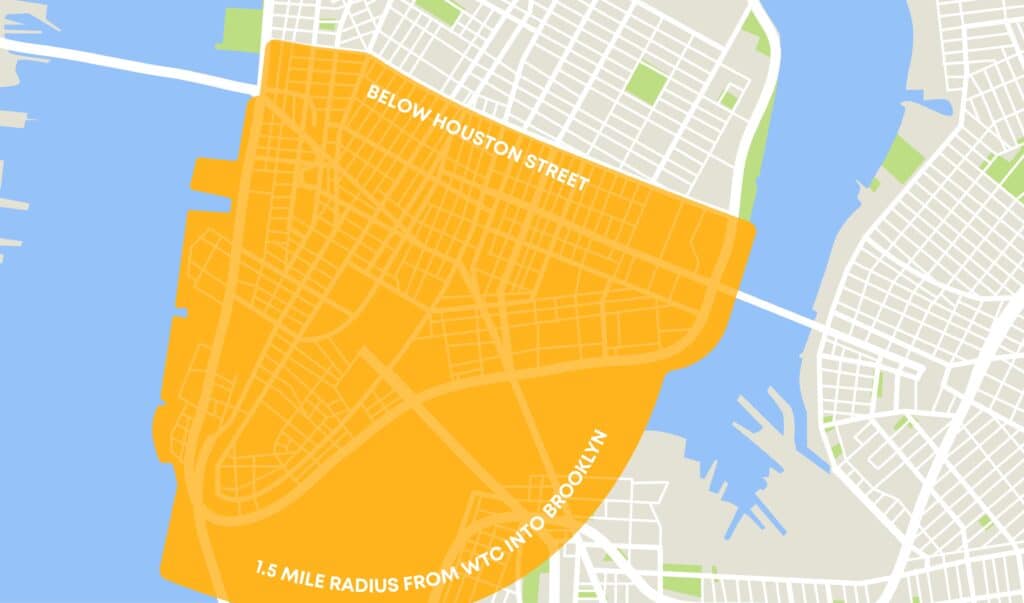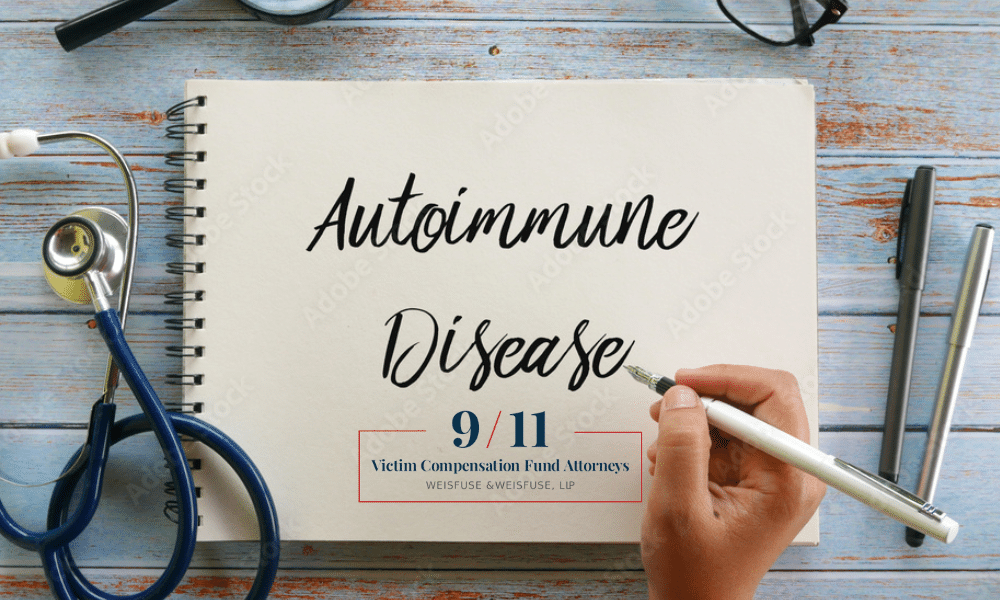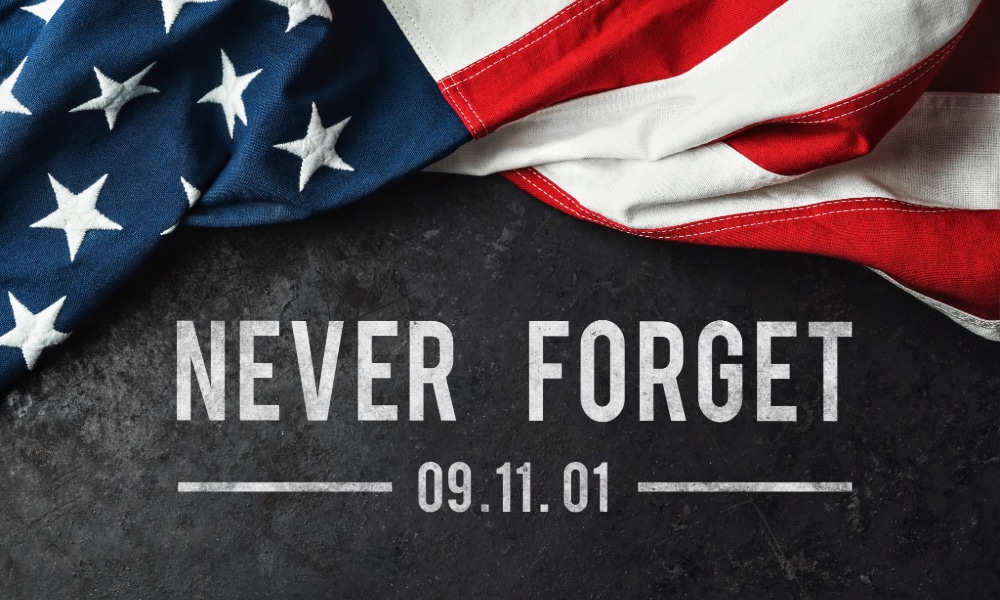
Updated Feb. 2025
For victims of the vicious terrorist attack on the World Trade Center, the Pentagon, and the crash in Shanksville, Pennsylvania, there is no going back to the way things were in the days, weeks, or months before 9/11.
Weisfuse & Weisfuse LLP represents 9/11 victims and their families to obtain financial compensation for those who have suffered 9/11-related cancers, injuries & illnesses made ill by the toxic dust, or who have lost a family member through the September 11th Victim Compensation Fund (VCF).
Here, we will summarize the types of financial compensation that is available to the victims of 9/11 and the payout awards that have been approved as of 2024.
Contaminants in the 9/11 toxic dust cloud
The collapse of the Twin Towers on September 11, 2001, unleashed a devastating toxic dust cloud over Lower Manhattan, exposing thousands of people to harmful pollutants. First responders, recovery workers, office employees, residents, students, and teachers all inhaled these dangerous contaminants for weeks and months after the attacks. This toxic mixture contained a dangerous array of substances, including:
- 24,000 gallons of jet fuel
- Pulverized building materials
- Cement dust
- Asbestos
- Dioxin
- Gypsum and calcite
- Polychlorinated biphenyls (PCBs)
- Microscopic shards of glass
- Silica
- Heavy metals
- Numerous organic compounds
The debris pile acted like a chemical factory, producing toxic fumes and gases as it burned. Combined with the collapse’s destruction of countless computers and other materials, the air in the area became saturated with carcinogens and irritants.
VCF compensation for 9/11 victims & their families
Nearly 3,000 souls perished as a direct result of the September 11th attacks:
- 189 at the Pentagon,
- 44 in the Pennsylvania plane crash, and
- 2,763 that were in or near the World Trade Center
Over 15,000 people have been diagnosed with World Trade Center-related cancers, and more than 2,000 deaths have been officially linked to these illnesses. As the 9/11 victim count continues to grow, the long-term effects of inhaling these contaminants remain a critical public health issue.
Families have lost partners, spouses, parents & children from either the direct attacks or from medical conditions related to the toxic dust exposure. The September 11th Victim Compensation Fund helps by bringing financial relief not only to first responders, such as FDNY firefighters or members of the NYPD, but to all those who suffered an injury, a 9/11-related illness, or the loss of a loved one.
The original September 11th Victim Compensation Fund (known as VCF1) was established by Congress shortly after the attacks and with a maximum of $7.35 billion to disburse, which also had to include operational and administrative costs. It covered only two “classes” of victims who suffered “physical injury or death as a result of the terrorist attacks of September 11, 2001,” including those who were present at the crash sites on 9/11 or the passengers or crew of any aircraft that crashed on 9/11 as a result of terrorist activity.
VCF 1 closed to new claims in December 2003, having disbursed average compensation for 9/11 victims of $7.049 billion to 5,560 claimants (97% of all claims to families). With concerns related to injuries and evolving illnesses among those who engaged in rescue, recovery, and cleanup at the 9/11 disaster sites, VCF was reopened in 2010 and reauthorized in 2015. Because of concerns that the fund was running out of money, it was again reauthorized and signed into law as the Public Law 116 – 59 – Continuing Appropriations Act, 2020, and Health Extenders Act of 2019, better known as the “Never Forget the Heroes: James Zadroga, Ray Pfeifer, and Luis Alvarez Permanent Authorization of the September 11th Victim Compensation Fund Act”.
This act fully funds the September 11th Victim Compensation Fund and reauthorizes it through the year 2090.
Victim Compensation Fund Payouts
In 2024, the annual report for the September 11th Victim Compensation Fund for 9/11 victims states it has been paid close to $1.94 billion, approved eligibility awards to 6,911 claimants, and processed 10,641 payments. This includes first responders, cleanup workers & volunteers, office workers, students, residents, and many others who were injured, made ill, or lost family members that fateful day in 2001.
As of the end of 2024, the September 11th Victim Compensation Fund has paid out almost $14.9 billion dollars, in total, to 9/11 victims and their families.
In the earliest years of the September 11th Victim Compensation Fund, payouts ranged from $500 to $8.6 million. The average death claim was compensated at $2,082,128. Claims for cancer did not exist until 2012.
How much do 9/11 victims get paid?
For most types of VCF cancer payouts, there is a cap of $250,000. The exceptions are primary basal cell cancer or squamous cell carcinoma (surface skin cancers) that may be compensated for up to $90,000. Remember that the $250,000 cap only applies to non-economic losses. There is still the potential for additional income losses and medical costs.
For airway and digestive disorders, including GERD, interstitial lung disease, chronic cough syndrome, and other chronic aero digestive issues that are 9/11-related, there is a cap of $90,000.
Death benefits to the survivors of victims who succumbed to a certified 9/11 illness are capped at $250,000 for a surviving spouse, plus $300,000 for the dependents.
Compound awards in cases of multiple and/or severe illnesses can be substantial and add up to $325,000 plus other non-economic awards.
9/11 VCF Payout Chart Awards
| Condition / Disorders | Award Amount |
|---|---|
| Airway and digestive disorders, including asthma, chronic cough syndrome, chronic laryngitis, chronic Nasopharyngitis, chronic respiratory disorder (from fumes and vapors), chronic rhinosinusitis, Gastroesophageal reflux disorder (GERD), interstitial lung disease, new-onset and WTC-exacerbated chronic obstructive pulmonary disease (COPD), reactive airway dysfunction syndrome (rads), sleep apnea and upper airways hyperreactivity. | Up to $90,000, varies from claim to claim. |
| Skin cancer (non-melanoma) | Up to $90,000, varies from claim to claim. |
| Prostate cancer | Up to $200,000 and possibly as much as $250,000 |
| Death | $250,000 for victim; $100,000 for spouse and each dependent |
| Other cancers include blood and lymphoid tissue (including lymphoma, myeloma, and leukemia), breast cancer (female & male), childhood cancers, cancers of the digestive system (including colon and rectum cancer), eye and orbit cancer, ovarian cancer, head and neck (oropharynx and tonsil cancer), mesothelioma, cancers of the respiratory system (including lung and bronchus cancer), melanoma skin cancer, soft and connective tissue cancer, thyroid cancer, urinary system cancers (including kidney and bladder cancer), uterine and endometrial cancer, and rare cancers. | $90,000 up to $250,000 or more, varies and depends on each particular claim |
| Multiple cancers / severe non-cancers | Up to $340,000 or more, varies and depends on each particular claim |
| Other less severe non-cancer conditions | Starts at $10,000 and may increase depending on the severity of the condition |
The following table outlines* the expected standard payouts for the pain and suffering endured for different types of illnesses and conditions (note: these sums are simply starting points and other awards may also be available, as discussed below):
How is VCF compensation for 9/11 victims calculated?
Each and every September 11th VCF claim submitted to the Victim Compensation Fund is calculated individually. The actual amount a victim or family of a deceased victim receives is based on the following formula:
- Economic loss + non-economic loss – collateral offset = compensation payout
Collateral offset: Compensation a claimant received from another source as a result of an eligible injury. This may include compensation from life insurance, pensions, Social Security survivor and dependents benefits, or previous settlement payments from 9/11 lawsuits.
Victim Compensation Fund eligibility criteria
Eligibility for 9/11 compensation from the VCF requires proof that a claimant:
- Registered with the September 11th Victim Compensation Fund within the deadline
- Has a 9/11-related medical condition that is certified by the World Trade Center Health Program
- Was present in one of the attack sites, such as the New York City Exposure Zone or the debris removal route, at some point between September 11, 2001 and May 30, 2002
- Has legal authority to make a claim on behalf of a deceased or incapacitated victim’s behalf
- Has dismissed, withdrawn, or settled any 9/11-related lawsuits prior to the appropriate deadline
9/11 Economic Loss Awards
Economic loss awards may be available from the Victim Compensation Fund.
These economic loss awards may potentially include:
- Lost wages
- Future loss of earnings
- Loss of employer-provided fringe benefits, e.g., health insurance, pension, 401(k)
- Loss of household services
- Funeral and burial expenses (in wrongful death cases)
The 9/11 compensation for economic loss caps out at $200,000 for each year of loss. The loss of earnings award is offset by pension, Social Security Disability (SSD) or private disability insurance. In the most extreme cases, where employee disability leads to extensive loss of earnings, claims can run into millions of dollars.
9/11 Non-Economic Loss Awards
The 9/11 Victim Compensation Fund will award money to compensate for non-economic losses, also known as pain and suffering.
Non-economic loss awards are presumed amounts based on the type of illness claimed. The non-economic loss award can be increased by presenting evidence of a significant effect on activities of daily living (ADLs). The six basic ADLs include:
- the ability to ambulate (move and walk),
- feed oneself,
- get dressed,
- attend to personal hygiene (wash, bathe, brush teeth, etc.),
- control one’s own bladder and bowel functions,
- toileting
Pain and suffering awards may also be increased by providing evidence of surgery or chemotherapy. In addition to cases of physical pain and suffering, the VCF may also make pain and suffering awards in cases of mental anguish, loss of consortium, loss of society and companionship, among others.
9/11 Deceased Claim Awards
9/11 deceased claims, sometimes known as wrongful death cases, can also lead to compensation from the VCF for the family of the deceased.
Some guideline sums have been set aside for the victims in such cases, including the following:
- $250,000 for a 9/11-related death
- $100,000 for a surviving spouse
- $100,000 for each surviving dependent of the deceased
Other deceased claim awards may include:
- Funeral and burial expenses
- Future economic losses (these can be significant)
- Loss of union or employer-provided benefits such as healthcare, pension benefits, future raises of pay increases, cost of living increases of adjustments (COLA), annuities, sick pay, vacation pay, etc.
- Loss of household services after the 9/11 victim became disabled or passed away
Some deceased claim awards can run into millions of dollars in compensation. In such cases, it’s generally best to seek legal assistance to cover everything that you are entitled to and maximize the claim, supporting it with the appropriate evidence and documentation.
How to prove eligibility for 9/11 VCF
A VCF award is only available to victims who can provide evidence of the following:
- Presence in the 9/11 Exposure Zone between 9/11 and May 30, 2002, and
- Evidence of a 9/11-related illness certified by the WTC Health Program (WTCHP) or similar.
Potential victims include first responders, volunteers, civilian area workers, residents, and students at the time. Provided that the eligibility requirements above are met, there is a good chance of receiving compensation for losses from the Victim Compensation Fund.
Similarly, family members of anyone who died from a 9/11-related illness or injury may be eligible for compensation.
Taxes and 9/11 VCF Award
Like with most major payouts, there may be federal tax implications to receiving a VCF award.
The good news is that VCF awards are, in general, exempt from federal income taxes. This includes the following payouts:
- Compensation for economic loss damages (e.g., loss of earnings, loss of benefits, etc.)
- Compensation for non-economic loss damages (pain and suffering)
The IRS guidance on this matter is quite specific to VCF awards and provides that any amounts awarded and paid by the VCF are not subject to federal income taxes.
However, your local 9-11 Victim Compensation Fund lawyer can advise you about whether any state or local taxes may apply to either payouts or investments made from any awards received.
What is your 9/11 Victim Compensation Fund claim worth?
While there are “typical” claims, no case is exactly the same with regard to compensation, as each victim has his or her own unique combination of circumstances & injuries. As a claimant, you may benefit from help from an experienced 9/11 attorney to ensure you receive full and fair compensation. If you are experiencing a medical condition or illness caused by exposure to the toxic dust from the WTC collapse or are a surviving family member, make sure you are getting the payout you need to move forward.
To schedule a free consultation with one of our skilled lawyers, contact Weisfuse & Weisfuse, LLP directly online or call us at 212-983-3000 for help today.
* A claim for compensation with the VCF is not a lawsuit but legal assistance may be advantageous to maximize and expedite a claim. Each claim is assessed according to the facts, circumstances, and supporting evidence provided.
Evidence should show proof of an individual’s presence in the Disaster Area between the applicable dates, as well as the illness suffered and any economic losses incurred from the illness, such as medical bills, loss of earnings/employee benefits, etc.
Most commonly, medical proof of a 9/11-related illness is established by registration and certification from the WTC Health Program.
No set payout chart or payment grid exists to calculate a VCF award. Each case is assessed on its own merits. VCF Award amounts are designed to reflect the severity and impact of various health conditions on victims’ lives.
General guidelines can be established based on our experience of handling claims for 9/11 victims over the years.

About Jason Weisfuse –
9/11 Victim Compensation Fund Attorney
About Jason Weisfuse –
9/11 Victim Compensation Fund Attorney
Jason E. Weisfuse is a seasoned 9/11 cancer attorney and managing partner at Weisfuse & Weisfuse, LLP, a New York City-based law firm dedicated to representing individuals affected by the September 11th attacks. Since the establishment of the September 11th Victim Compensation Fund (VCF), Jason has been instrumental in assisting first responders, survivors, and families in securing the compensation and medical benefits they deserve.
With a Juris Doctor from New York Law School (2009), Jason brings extensive experience regarding the 9/11 Victim Compensation Fund to his practice. His deep understanding of the VCF and the World Trade Center Health Program (WTCHP) has enabled him to navigate complex claims processes effectively, resulting in substantial awards for his clients.
Jason’s commitment to the victims in the 9/11 community is evident through his active involvement in professional organizations such as the New York State Trial Lawyers Association and the American Association for Justice. He has also contributed to legal discourse with publications in the New York Law Journal, reflecting his dedication to legal excellence and advocacy.
At Weisfuse & Weisfuse, LLP, Jason continues to provide compassionate and knowledgeable representation, ensuring that those affected by 9/11 receive the support and compensation they are entitled to.







